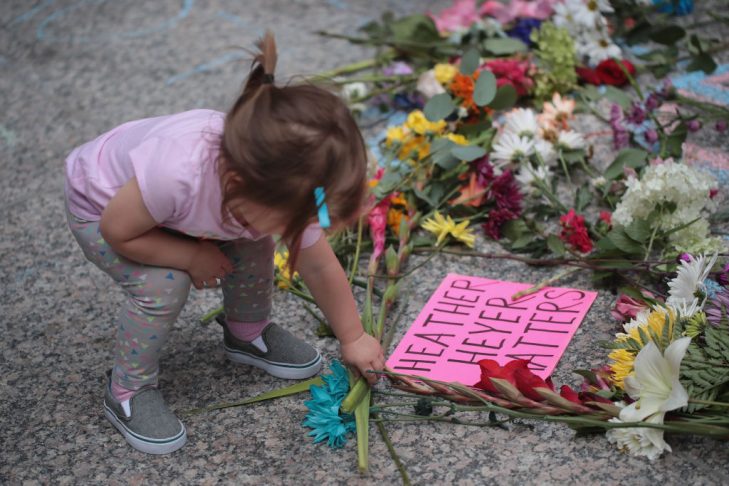We asked parents whether and how they were explaining last weekend’s protests in Charlottesville to their kids. Here’s what they had to say. Have you talked to your kids about Charlottesville or about racial divides in general? Let us know in the comments.
“We read the ‘March’ graphic novel series by John Lewis. They’re tough books, but we talked through the issues. Later, when we found out about the death of Heather Heyer, we talked about how the same forces that John Lewis faced remain relevant today. And we talked about the need for people to remain brave and to fight for what is right. All the while emphasizing that Lewis won, and that as long as people remain brave enough to fight, those forces that Lewis fought will keep on losing.”
—Dad of a 7-year-old
Related
“We’re not talking about it. For these things, I don’t bring it up unless I have to. Our oldest is 9; why freak her out? But, through the PJ Our Way program, she’s reading about anti-Semitism from a historic perspective.”
—Mom of a 9-year-old
“We talk about how all people are different on the outside; that’s what makes us all unique—dark skin, light skin, brown eyes, blue eyes, red hair, black hair. However, all people are the same on the inside. As my 5-year-old daughter reminds me, we all have hearts, stomachs and blood! I then ask her if, because someone looks different on the outside, does that mean we can treat them meanly or different? And her response is, ‘No, we are all different, but we are also the same.’
“We also talk about the golden rule: Treat everyone how you want to be treated. It helps that our day care is very diverse, so she has lots of friends of different religions, backgrounds and ethnicities. You don’t hide the differences; you celebrate them and learn from them, and it’s fun participating in different celebrations and traditions with your friends, and also sharing ours with theirs.”
—Mom of a 5-year-old
“I always try to get my daughter to see that people who hate so much have something hurting them, something that is blinding them. There is enough of all we need for everyone. Hate comes from the fear you won’t get what you need and that others will. Then I let her lead the conversation.”
—Mom of a 7-year-old
“My kids get the concrete facts, but they don’t get racism. They just don’t. Which, in a way, is good. But I need my blue-eyed children to understand there are people in the world who assume different things about them as compared with some of their friends. I’m trying. Years ago, my son came home from pre-K crying because he thought he and a friend wouldn’t be able to sit on the bus together the following year. It was all confusion over a Rosa Parks book. They indeed sat together many, many times in the years to come. There are always teachable moments, I suppose; you just have to take advantage. There is one other topic we discussed, and that’s the fact that free speech doesn’t mean speech without consequence.”
—Parents of a 10-year-old, 8-year-old, 6-year-old and 1-year old
“I know this might be unpopular, but I am not talking to my kids about it. They are 4 and 7, and I want their attention called more to what is going on in their own school and neighborhood in how we treat people. … What is even more important is what’s happening in our minute-to-minute interactions with the people all around us. I want my kids to focus on that rather than feeling alienated from their fellow humans by hearing about scary things they can’t impact. I’m concerned we grown-ups are starting to lose faith in humanity when we hear these horrible stories. It makes us forget the importance and widespread-ness of the wonderful things the majority are seeing and doing every day, and the impact we can all have on making the world better.”
—Mom of a 4-year-old and 7-year-old




